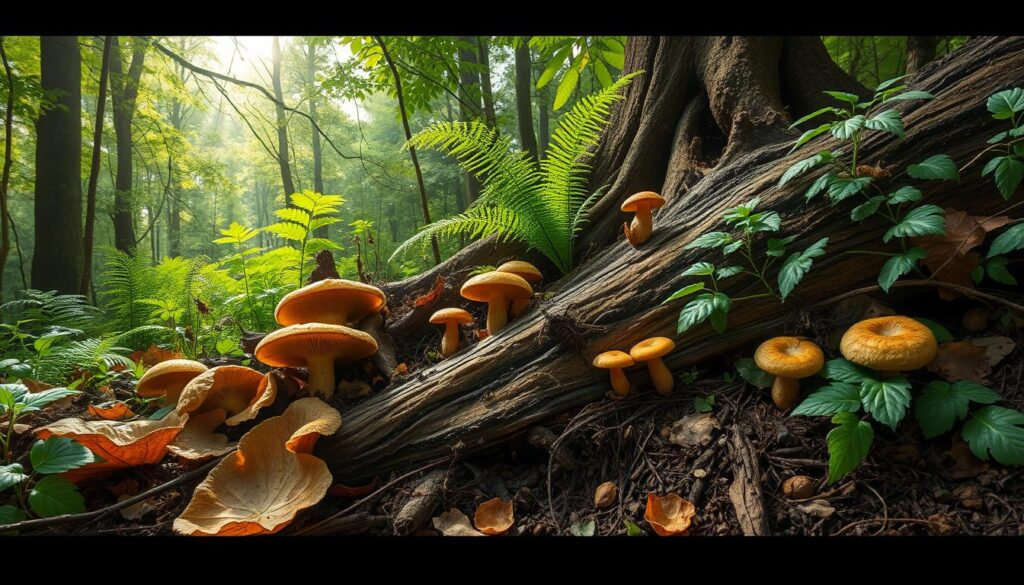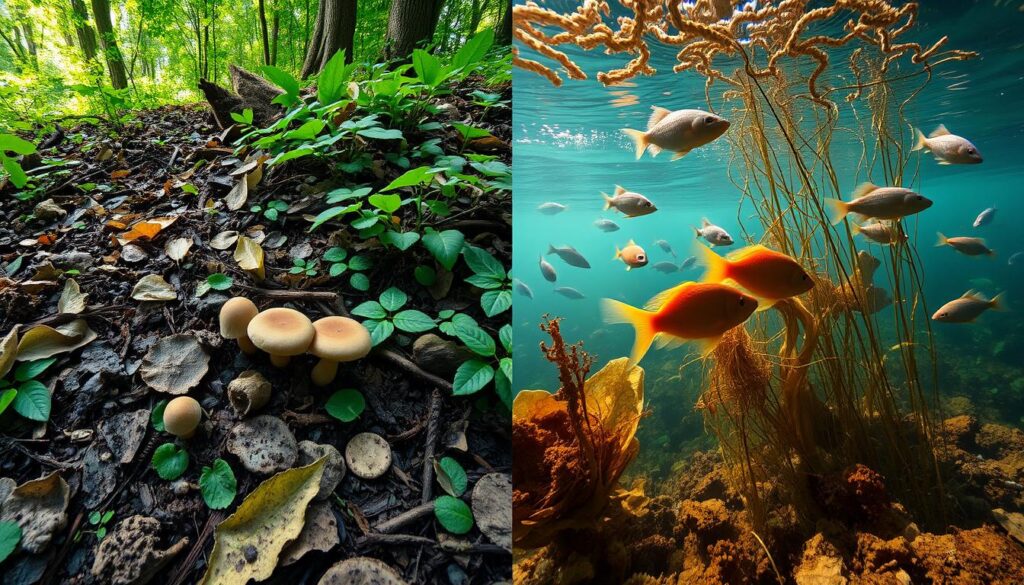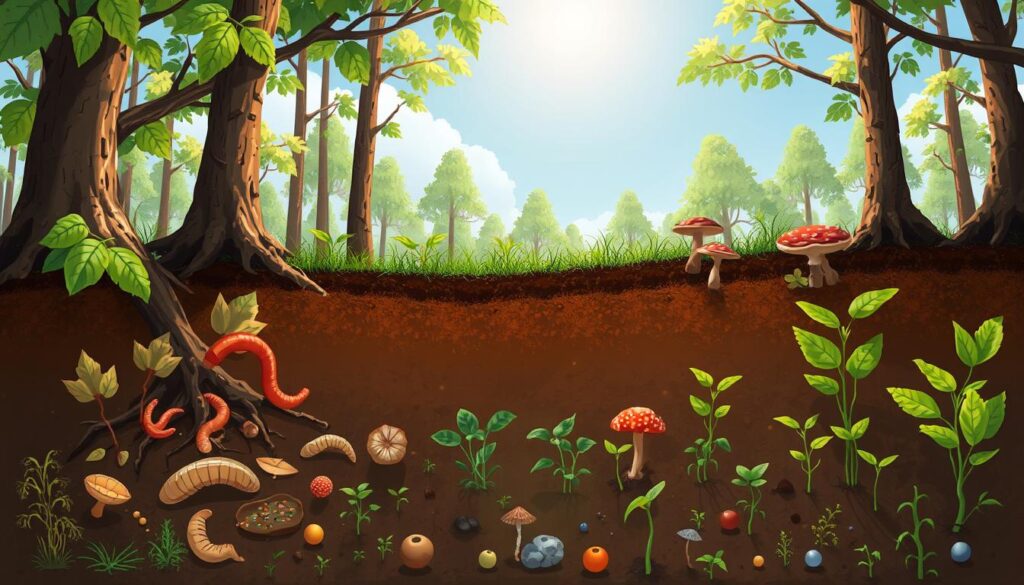
A vibrant forest scene depicting the natural process of decomposition, showcasing fallen leaves, mushrooms, and rotting wood intertwined with lush green ferns, insects crawling, and rich soil teeming with life, all under soft dappled sunlight filtering through the canopy above.
Decomposition is the natural process of breaking down dead organic material. This includes plants, animals, and other living organisms. It’s a key part of nature’s cycle, recycling nutrients and supporting life on Earth.
Through the work of detrivores and saprophytes, dead things are transformed. They release essential elements back into the soil and water. This fuels the growth of new life.
Key Takeaways
- Decomposition is the natural breakdown of organic matter by detrivores and saprophytes.
- It is a crucial process that recycles nutrients and sustains ecosystems.
- Decomposition is a fundamental part of nature’s cycle, enabling the continuous renewal of life.
- Understanding decomposition helps us appreciate the intricate interconnectedness of all living things.
- Studying decomposition provides insights into nutrient cycling and the health of our environment.
The Wonders of Decomposition
Decomposition is a fascinating natural process at the heart of life and ecosystem balance. It’s all about nutrient recycling, which is key for our planet’s health. This cycle is vital for keeping our world in balance.
Why Decomposition Matters
Decomposition breaks down organic matter, releasing nutrients into the soil and water. It’s essential for the ecosystem’s energy and material flow. Without it, life would stop, and our food webs would collapse.
The Cycle of Life and Death
Decomposition is about life and death working together. When organisms die, their bodies help new life grow. Decomposers like fungi and bacteria recycle nutrients back into the environment. This keeps the ecosystem alive and thriving.
“Decomposition is the unsung hero of the natural world, quietly sustaining the delicate balance that allows life to thrive.”
What is Decomposition?
Decomposition is a natural process that is key to life and death. It breaks down dead plants, animals, and other living things into simpler parts. This is done by organisms like bacteria, fungi, and others.
At its heart, decomposition means the breakdown of organic matter into simpler pieces. This important process is the base of nutrient recycling and keeps ecosystems full of life.
The process of breaking down organic material is complex. It involves many organisms working together. From the start of physical breakdown to the end of chemical change, decomposition is essential for life on Earth.
“Decomposition is the process of breaking down organic matter into simpler substances, a crucial step in the recycling of nutrients that sustains life on Earth.”
Understanding decomposition and the breakdown of organic matter helps us see its importance. It’s a key part of the circle of life. It makes sure nutrients from dead things go back to the soil, air, and water, ready for living things to use again.
Decomposition is the process of breaking down complex entities into simpler parts. This concept can apply in various contexts:
- Biology: In ecology, decomposition refers to the breakdown of organic matter, like dead plants and animals, by decomposers (bacteria, fungi, etc.), which recycles nutrients back into the ecosystem.
- Chemistry: It describes the process where compounds break down into simpler substances, often through chemical reactions.
- Mathematics and Computer Science: Decomposition involves breaking down a problem into smaller, more manageable subproblems. This is often used in algorithms and programming to simplify complex tasks.
- Project Management: In this context, it refers to breaking a large project into smaller, actionable tasks or milestones.
Overall, decomposition helps in understanding, managing, and solving complex systems by focusing on their simpler components.
Decomposition Agents: Nature’s Recyclers
Two main groups of organisms help break down dead matter: detrivores and saprophytes. They are key in the cycle of life and death. They turn dead organic matter into nutrients for the ecosystem.
Detrivores: The Shredders
Detrivores, like earthworms and insects, physically break down dead material. They shred and digest it. This makes it ready for other organisms to further break it down.
Saprophytes: The Dissolvers
Saprophytes, including fungi and bacteria, dissolve dead material with enzymes. They turn it into simpler compounds. These compounds are then used by other living things.
Detrivores and saprophytes work together. They recycle nutrients in the environment. This keeps the ecosystem healthy and thriving.
The Decomposition Process
Decomposition is a natural process that breaks down dead plants and animals into simpler compounds. It’s a key part of the stages of decomposition and the breakdown of organic matter in ecosystems. Knowing about these stages helps us understand how nutrients flow and resources are recycled in nature.
Stages of Decomposition
The decomposition process has several stages:
- Physical Breakdown: The first stage is the physical breakdown of organic material. This is often helped by wind, water, and physical disturbances.
- Chemical Transformation: Next, the broken-down material undergoes chemical changes. Bacteria and fungi help break down complex compounds into simpler ones.
- Biological Mineralization: The final stage is complete mineralization. Here, the nutrients are released back into the environment, ready for new life to use them.
This detailed process ensures the continuous recycling of essential nutrients. It keeps ecosystems balanced and supports the growth of new life.
“Decomposition is the key to the circle of life, ensuring that the nutrients in dead organic matter are returned to the soil and water, ready to be used by new life.”
The stages of decomposition, particularly in the context of organic matter, can be generally categorized into several phases:
- Fresh Stage: This begins immediately after death. The body starts to cool, and rigor mortis (stiffening of muscles) sets in. Bacteria begin to break down tissues.
- Bloat Stage: As bacteria continue to break down the body, gases accumulate, causing swelling. The skin may discolor, and fluid may leak from orifices.
- Active Decay Stage: This phase involves significant loss of mass as tissues decompose. The body may emit strong odors due to the release of gases and fluids. Insects, especially blowflies, are often attracted during this stage.
- Advanced Decay Stage: At this point, the bulk of soft tissues have decomposed, leaving behind bones and hair. The rate of decomposition slows significantly.
- Dry Remains Stage: Only skeletal remains and some dried tissues remain. This stage can last a long time, depending on environmental conditions.
Environmental factors like temperature, moisture, and presence of insects can influence the rate and nature of decomposition throughout these stages.
Factors Affecting Decomposition
Decomposition is the natural process of breaking down organic matter. It’s influenced by many environmental conditions. Knowing what affects decomposition helps us understand the life and death cycle in ecosystems.
Temperature is a key environmental condition. Warmer temperatures speed up the work of microbial decomposers like bacteria and fungi. This leads to faster breakdown of organic material. On the other hand, colder temperatures slow down this process, keeping organic matter intact for longer.
Moisture levels also matter a lot in decomposition. Moisture is needed for decomposer organisms to grow and thrive. But too much moisture can limit oxygen, slowing down the breakdown of aerobic organisms.
The role of decomposition agents is crucial too. These include detrivores (shredders) and saprophytes (dissolvers). They break down dead material, releasing nutrients back into the soil or water.
Other important factors include the pH of the environment, oxygen availability, and the chemical makeup of the organic material. These can either speed up or slow down the decomposition process. This affects nutrient cycling and ecosystem dynamics.
By understanding these factors, we can better appreciate the balance and interdependence in nature. This knowledge helps us manage resources sustainably and work towards environmental conservation.
Several factors influence the rate and process of decomposition:
- Temperature: Warmer temperatures generally accelerate decomposition by promoting microbial activity. Cold environments slow down the process.
- Moisture: Adequate moisture is essential for microbial activity. Too little moisture can inhibit decomposition, while too much can create anaerobic conditions that slow down the process.
- Oxygen Availability: Aerobic conditions (presence of oxygen) enhance decomposition, while anaerobic conditions (absence of oxygen) can lead to slower decomposition and the production of different byproducts.
- pH Levels: The acidity or alkalinity of the environment can affect microbial activity. Most decomposers thrive in neutral to slightly acidic conditions.
- Type of Organic Material: Different materials decompose at different rates. For example, soft tissues (like muscle) decompose faster than hard tissues (like bone) or plant matter.
- Presence of Decomposers: Bacteria, fungi, insects, and other organisms play a crucial role in breaking down organic material. Their abundance and activity levels can significantly influence decomposition rates.
- Size and Surface Area: Smaller pieces of organic matter or those with greater surface area decompose faster than larger, denser materials.
- Environmental Conditions: Factors such as soil type, vegetation, and surrounding fauna can also impact decomposition rates.
Understanding these factors can help in fields like ecology, forensic science, and waste management.
Decomposition in Different Environments

A split scene depicting terrestrial and aquatic decomposition: on the left, a forest floor rich with fallen leaves, mushrooms, and insects breaking down organic matter amidst vibrant greenery; on the right, an underwater landscape showcasing decaying plant material and fish, with soft light filtering through water, surrounded by diverse aquatic life.
The ways terrestrial decomposition and aquatic decomposition work are quite different. This is because of the unique settings of these two worlds. Knowing how they differ helps us understand decomposition’s role in nature.
Terrestrial Decomposition
In terrestrial ecosystems, decomposition is led by soil life like bacteria, fungi, and insects. They break down dead plants and animals. The rate of this process depends on soil type, temperature, and moisture.
Aquatic Decomposition
In aquatic environments, decomposition is affected by water flow, oxygen, and special water dwellers. It’s slower than on land because of less oxygen and unique needs of water creatures.
| Factor | Terrestrial Decomposition | Aquatic Decomposition |
|---|---|---|
| Driving Agents | Soil organisms (bacteria, fungi, invertebrates) | Aquatic microorganisms and invertebrates |
| Oxygen Levels | Aerobic (high oxygen content) | Anaerobic or low oxygen (submerged environments) |
| Decomposition Rate | Generally faster | Generally slower |
| Nutrient Cycling | Efficient, influenced by soil composition | Less efficient, influenced by water currents and oxygen levels |
The environmental differences between land and water affect how terrestrial decomposition and aquatic decomposition happen. Each is vital in its own ecosystem, showing the cycle of life and death.
The Importance of Decomposition in Ecosystems
Decomposition is key to keeping ecosystems healthy and balanced. It breaks down organic matter, releasing nutrients that plants need to grow. This process is vital for the ecosystem’s health and balance.
Nature’s recyclers, like detrivores and saprophytes, play a big role. They eat dead and decaying material, turning it into nutrients for plants. This cycle is the base of the ecosystem’s health and productivity.
If decomposition didn’t happen, ecosystems would struggle to support life. It provides nutrients for plants and helps with soil health. This is crucial for a thriving environment.
Decomposition’s impact goes beyond individual ecosystems. It helps spread nutrients across landscapes, boosting regional and global environments. This shows how important decomposition is for our planet’s health.
“Decomposition is the unsung hero of the ecosystem, quietly yet tirelessly recycling the building blocks of life.”
Understanding decomposition’s role in ecosystem health and nutrient cycling is crucial. It helps us see the complex web of life that supports our world. Preserving this process is key to keeping our planet diverse and healthy.
Decomposition and Nutrient Cycling

A vibrant forest scene illustrating the cycle of nutrients, featuring decomposing leaves, worms, and fungi breaking down organic matter, with rich soil teeming with microorganisms, young plants growing, and a clear sky above highlighting sunlight filtering through the trees.
Decomposition is key in nutrient cycling. It moves nutrients through the environment. When organic matter breaks down, nutrients like nitrogen, phosphorus, and potassium are freed. These nutrients help plants grow and develop.
This recycling is vital for soil fertility. It keeps ecosystems productive.
Many organisms, like detrivores and saprophytes, decompose dead plants and animals. They break down organic matter. This releases nutrients back into the soil.
This nutrient-rich soil feeds plants. It completes the cycle of life and death.
| Nutrient | Role in Plant Growth | Source from Decomposition |
|---|---|---|
| Nitrogen (N) | Crucial for plant structure and chlorophyll production | Decomposition of organic matter, such as plant and animal remains |
| Phosphorus (P) | Essential for root growth, flower/fruit development, and energy transfer | Breakdown of organic compounds containing phosphorus |
| Potassium (K) | Regulates plant water balance, disease resistance, and overall vigor | Decomposition of organic materials, including wood and leaves |
Understanding decomposition in nutrient cycling helps us see ecosystem balance. It shows why healthy soil and environments are crucial. This knowledge guides sustainable land use. It ensures soil stays fertile and plants keep growing.
Human Impacts on Decomposition
Decomposition is a natural process that keeps our ecosystems balanced. But, human actions can change this process in big ways. It’s important to know how we affect decomposition to keep our planet healthy.
Good waste management and composting can help decomposition. By not sending organic waste to landfills, we let it break down naturally. This way, nutrients go back into the soil, helping new life grow. Also, using green cleaning products and reducing chemicals helps decomposition agents like detrivores and saprophytes do their job well.
But, some human actions harm decomposition. Changes in land use, like deforestation and urban growth, hurt the homes of decomposition agents. This can lower their numbers and mess up the cycle. Too many pesticides and chemicals also harm the organisms that break down organic matter, making things worse.
To make things better, we need to use eco-friendly waste management and cut down on harmful chemicals. We should also protect the natural places where decomposition happens. By understanding and fixing our impact on decomposition, we can help our planet stay healthy and strong for the future.
“Decomposition is the cornerstone of environmental sustainability, and our actions as humans have a profound impact on this crucial process.”
Conclusion
Decomposition is key to the natural world. It keeps ecosystems balanced and supports the growth of all living things. By breaking down organic matter, decomposition recycles nutrients, keeping our environment healthy.
Agents like detrivores and saprophytes work together to break down dead matter. They turn it into nutrients for new life. This cycle is essential for our world’s health and balance.
As we face environmental challenges, decomposition’s role grows more important. Understanding and managing this process helps us protect our planet. It ensures the well-being of all species and the sustainability of our world.
Important Point
| NO. | Important Points |
| 1. | About Us |
| 2. | Contact Us |
| 3. | Disclaimer |
| 4. | Privacy Policy |
FAQs of Decomposition
What is decomposition?
Decomposition is when dead plants, animals, and other living things break down into simpler parts.
Why is decomposition important?
Decomposition keeps ecosystems balanced and connected. It breaks down organic matter, releasing nutrients into the soil and water. These nutrients help plants and other living things grow.
Who are the main agents of decomposition?
Detrivores and saprophytes are the main agents of decomposition. Detrivores, like earthworms and insects, physically break down organic matter. Saprophytes, including fungi and bacteria, use enzymes to dissolve and digest dead material.
What are the stages of decomposition?
Decomposition has several stages. First, organic material is physically broken down. Then, it undergoes chemical and biological changes. Finally, it is fully mineralized, releasing nutrients back into the environment.
How do environmental factors affect decomposition?
Environmental factors like temperature, moisture, and oxygen levels affect decomposition. These factors can speed up or slow down the breakdown of organic matter. This impacts nutrient cycling in ecosystems.
How does decomposition differ in terrestrial and aquatic environments?
Decomposition differs between land and water. On land, it’s mainly driven by soil organisms. In water, it’s influenced by currents, oxygen levels, and aquatic decomposers.
How do human activities impact decomposition?
Human activities can both help and harm decomposition. Proper waste management and composting can aid it. But pollution, land-use changes, and chemical use can harm it. It’s important to understand and reduce these impacts for environmental sustainability.

Pingback: Desiccation: Understanding the Drying Process 1